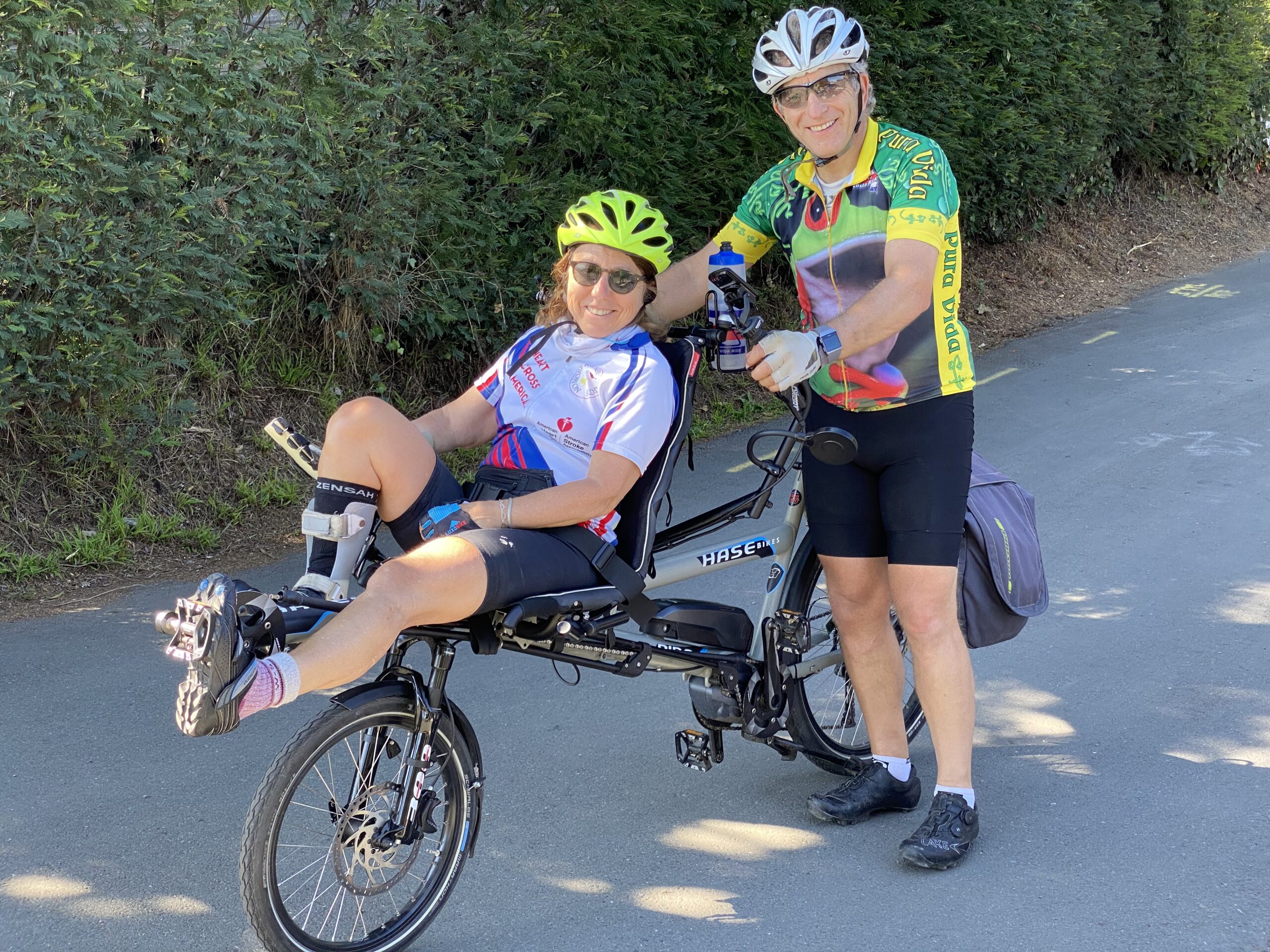
14 Aug Adaptation is a way of life
Everyone adapts all the time. To the weather. To new information. To what other people do around you. We certainly did our share of adapting in our lives before stroke.
But living with disabilities has given that word, that strategy, new meaning for us. Some adaptations allow small, seemingly mundane activities without help — and that independence is anything but mundane! Like finding a crescent shaped knife to cut many foods with one hand, and discovering “Hickeys” — rubber laces that turn sneakers into slip-on shoes that can be managed with one hand.
Others are huge — like changing careers. Deb was forced from her cherished role as a professor due to aphasia. Steve chose to reduce time at Self-Help — meaningful and loved work — so that together we can build meaning and purpose into our lives through the work of Stroke Onward.
But this blog is about having fun! We all want fun in our lives! Yet stroke, and other traumas that leave people with disabilities, often make the activities we enjoyed unavailable to us — at least in precisely the same way they were available before. And “carepartners” may want to adapt activities that don’t have to change, to enjoy and share important activities with our partners.
Sports and active recreation were central to our lives, and our relationship, from the beginning. We got to know each other skiing with friends during grad school. Our romantic relationship began while skiing at Snowbird in Utah. Steve proposed while we were overlooking the Pacific in the middle of a 50 mile bike ride. Our honeymoon was on a rented sailboat. One of our first arguments with our parents after Danny, our first, was born, was whether it was safe to put him in a jogging stroller when he was only several weeks old, or ski with him in a kiddie backpack when he was not quite one. You get the idea.
When physical limitations became a reality in our lives, we were unwilling to give up things we love — so we had to adapt. If you follow us on social media, you’ve seen some pictures of us biking lately. We are, right now, nearing the end of an extended cycling vacation. We had to cancel a planned 3-week cycling trip to the pacific northwest due to COVID, but we’re doing day rides almost every day — many with friends. Deb’s right side impairment prevents riding a traditional bike, so we borrowed a tandem about three years after the stroke, and off we went. Giving up control was infuriating for Deb, but we had to adapt. After five years and several thousand miles, Deb’s spasticity was still creating calf cramps, so we looked for, and found, a tandem that worked better for us (thank you BORP!). Cycling, always something we enjoyed, has become a central activity for us — supporting both our physical and mental health in our post-stroke lives.
Deb can’t run anymore, but with the help of a walking stick can still walk, and even hike on smooth trails. Wanting to do a longer family “trek” several years ago, we found an outfit that would rent us a saddle horse to ride when the walking was too much. We’ve written before about swimming — using a snorkel and mask and “arm floaty”, and that even if someone at the pool has to help put on a swim cap and mask, swimming again became an “independent” activity. Deb can’t ski the steeps as she did in the past, but after 7 years of figuring out equipment (thank you Achieve Tahoe for your early help) she again loves her time on the slopes. And Steve loves that he can enjoy it with Deb, and appreciates her further “adaptation” — encouraging him to do the kind of skiing she can no longer do with other ski buddies. We found a creative use for a “knee scooter” to let us “walk the city” — our favorite way to explore new places we visit.
We are acutely aware that many of these adaptations require money — something all too many people don’t have enough of. It’s why we hope to get increasingly involved in disability rights advocacy — especially the need for insurance to cover adaptive devices that aid in one’s emotional recovery, not just their physical rehabilitation. And, fortunately, there are great nonprofits like BORP and Adaptive Sports that help create access for all, and some adaptation does not require a lot of resources — like walking/hiking to replace running, or swimming in a public pool. And, of course, every disability situation is different, with some more severe than others. We have been so inspired by people we have met — some with seemingly insurmountable physical constraints — who have found ways to build some of what they love back into their lives through creative thinking and perseverance.
How do you adapt? Any ideas others might like or learn from? As we said in Identity Theft — “every person is different, every stroke is different, every recovery is different.” That includes different interests, different sources of joy, and different levels and kinds of resources to pursue them.
We’ll be sharing thoughts about adaptation through social media @StrokeOnward. Please follow us on whatever platforms you use — we’re on Facebook, Twitter, Instagram, and LinkedIn.
Join us there and share your thoughts about how you can use adaptation as part of your journey to rebuild identity and a rewarding life.
Stay safe and healthy during these crazy times. Warmly,
Debra and Steve





No Comments